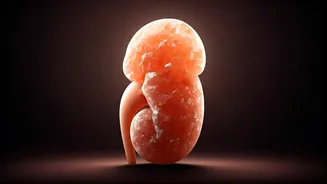Salt's Impact on Kidneys
The kidneys play a crucial role in filtering waste and regulating blood pressure. High salt intake elevates blood pressure, putting undue stress on these
vital organs. Over time, this can lead to kidney damage and various complications. A Chennai urologist emphasizes that excessive salt can strain the kidneys, leading to chronic kidney disease or even kidney failure. This underscores the need for mindful salt consumption to maintain optimal kidney function. Understanding the direct link between salt, blood pressure, and kidney health is the first step toward adopting healthier eating habits. Regular monitoring of salt intake, combined with other healthy lifestyle choices, can significantly reduce the risk of kidney-related issues and promote overall well-being.
Hidden Sodium Sources
Salt, or sodium chloride, isn't always obvious in our diet. Many processed foods, such as canned soups, ready meals, and packaged snacks, contain significant amounts of hidden sodium. Furthermore, condiments like soy sauce, ketchup, and salad dressings often contribute to excessive salt intake. Even seemingly healthy choices like bread and some breakfast cereals can be high in sodium. Reading food labels carefully is critical. Check serving sizes and the amount of sodium per serving to make informed choices. By being aware of these hidden sources, individuals can proactively reduce their overall salt intake. Opting for fresh, unprocessed foods and cooking at home allows for greater control over the sodium content of meals, ultimately benefiting kidney health and overall wellness.
Flavorful Salt Alternatives
Reducing salt doesn't mean sacrificing flavor. Explore various alternatives to enhance the taste of your meals. Herbs and spices, such as basil, oregano, thyme, and rosemary, can add depth and complexity to dishes. Garlic, onion, and ginger provide aromatic flavors that can replace the need for salt. Citrus fruits, like lemon and lime, can brighten up dishes and enhance flavors. Vinegar, in moderation, also provides a tangy dimension. Experimenting with different flavor combinations can transform ordinary meals into culinary delights. Using these flavorful substitutes allows individuals to reduce sodium without compromising on taste, leading to healthier eating habits and improved kidney health. The transition to a low-salt diet can be enjoyable and satisfying with the right culinary adjustments.
Cooking Strategies for Less Salt
Adopting specific cooking techniques can significantly reduce salt usage. When cooking, season food towards the end of the cooking process, this allows you to better control the amount of salt used. Avoid adding salt to boiling water for pasta or vegetables; instead, season the food after cooking. Marinating foods with herbs, spices, and citrus juices can infuse flavor without adding salt. Choose fresh, whole ingredients and prepare meals from scratch, which provides greater control over the sodium content. Using non-stick cookware can sometimes reduce the need for salt, as food is less likely to stick and require added seasoning. These culinary techniques enable individuals to create delicious, low-sodium meals that support kidney health and enhance overall well-being. By making these small adjustments to cooking practices, the journey toward a healthier lifestyle becomes simpler and more rewarding.
Gradual Salt Reduction
Changing your palate to prefer less salt requires a gradual approach. Abruptly cutting out salt can be difficult, so focus on gradually decreasing the amount you use. Start by reducing the salt in your cooking and at the table. Over time, your taste buds will adapt and become more sensitive to natural flavors. Be patient with the process, and don't get discouraged if it takes some time to adjust. Each day, focus on making small, sustainable changes to your diet. Consider keeping a food diary to track your salt intake and identify areas where you can reduce sodium. By embracing a slow and steady approach, you can successfully lower your salt consumption and improve your kidney health without sacrificing the enjoyment of food. This gradual process makes the transition easier and more effective for long-term health benefits.
Mindful Eating Habits
Beyond cooking and flavoring, mindful eating habits play a significant role in reducing salt intake. Pay attention to food labels and portion sizes to monitor sodium content accurately. When eating out, request that the chef use less salt in your meal. Avoid adding salt at the table, and instead, try adding herbs, spices, or lemon juice to enhance flavor. Being aware of your eating habits and the impact of each choice contributes to overall kidney health. Make informed choices and seek professional advice from a doctor or a registered dietitian if you have concerns about your salt intake. Incorporating mindful eating practices into your routine supports a balanced diet and promotes long-term wellness. By adopting these strategies, individuals can proactively manage their salt consumption and improve their overall health.


















